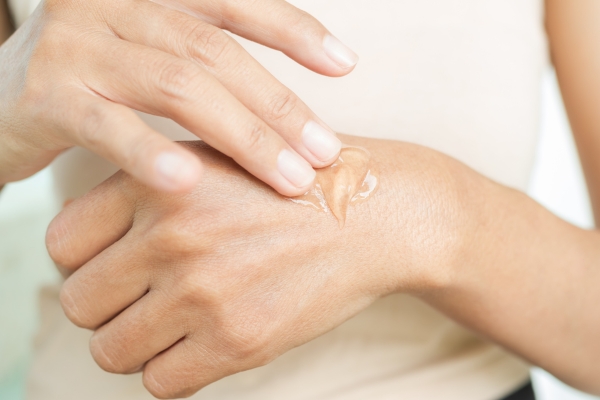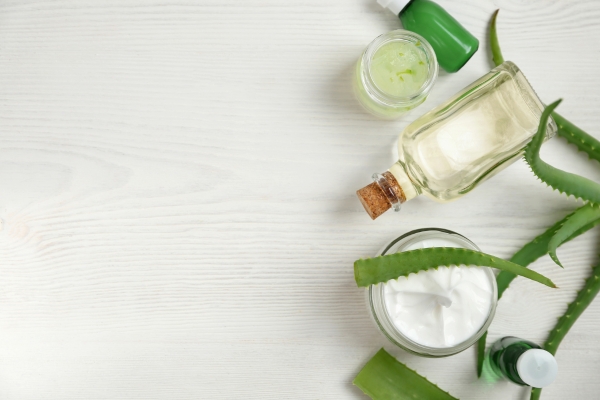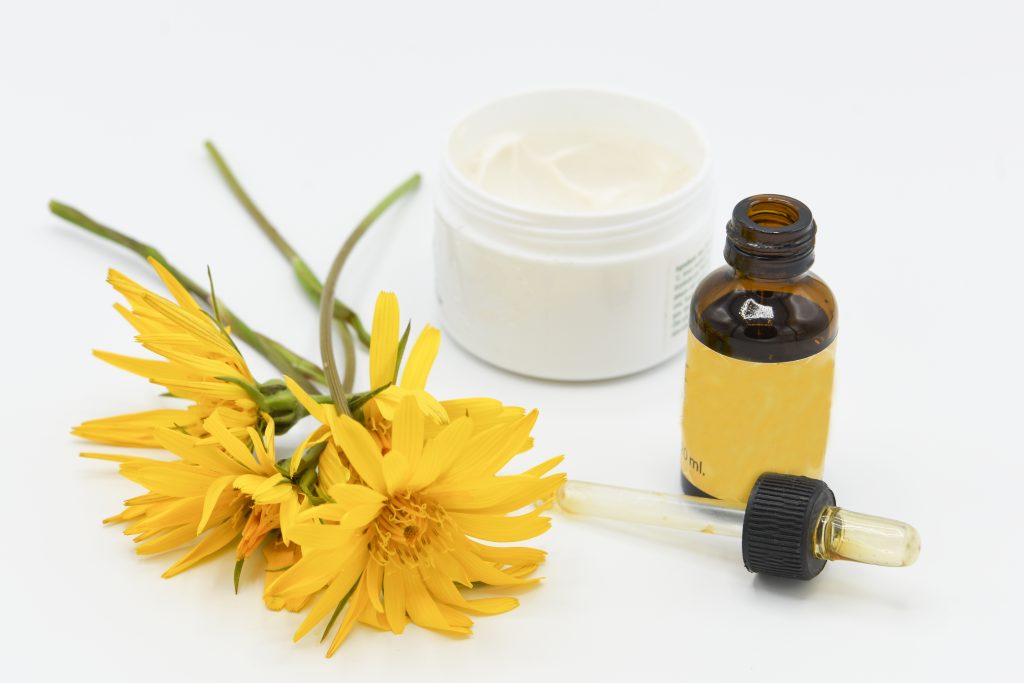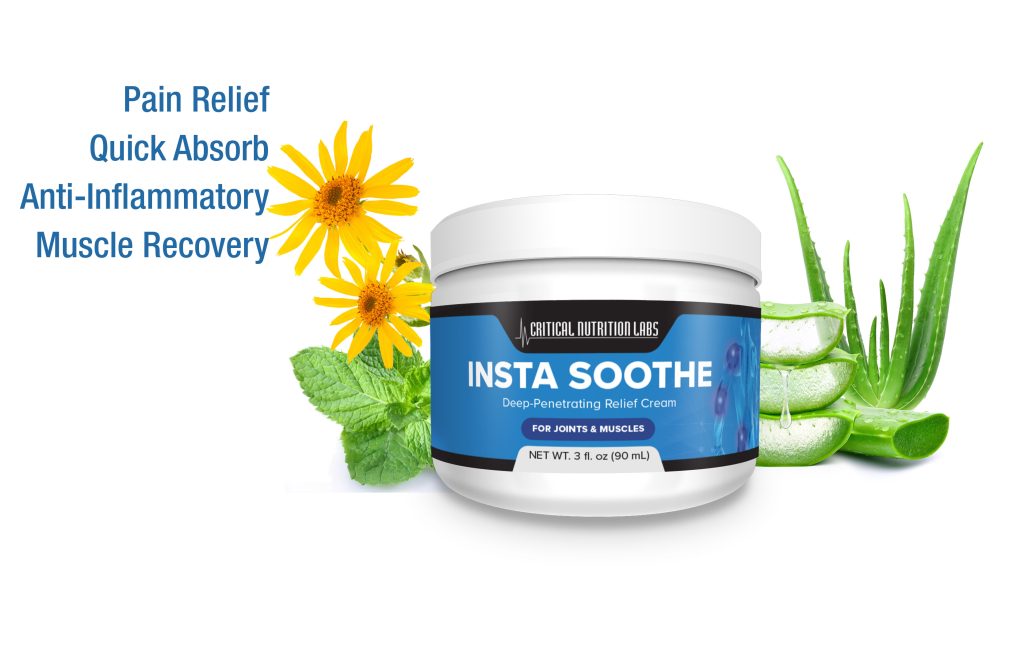Aloe vera isn’t just for sunburns anymore.
It’s showing up in products meant to ease sore muscles, challenging the idea that only synthetic stuff works.
Let’s take a closer look at the benefits of aloe vera for muscle creams.
We’ll also dive into how aloe vera and other natural ingredients are shaking things up, offering a more natural choice in lieu of those tired of hard-to-pronounce chemicals in their muscle relief creams.

The Science of Aloe Vera
Aloe vera, a succulent plant, has been a cornerstone in medicinal practices for centuries, revered for its myriad of health benefits.
At the heart of aloe vera’s prowess lies its juice, a gelatinous substance extracted from the plant’s leaves, rich in a cocktail of beneficial components.
Nutritional Profile
Aloe vera juice contains vitamins including A, C, E, and B12, each playing pivotal roles in skin health and immune function.
Minerals like calcium, magnesium, and zinc are present, contributing to the juice’s healing capabilities by supporting tissue repair and cellular function.
Enzymes and Anti-inflammatory Properties
The juice also contains enzymes like bradykinase, which help to reduce inflammation when applied to the skin or ingested.
These enzymes, along with plant steroids, contribute to the anti-inflammatory and analgesic properties of aloe vera, making it an effective remedy for soothing muscle and skin tissues.
Moisturizing and Healing Components
Polysaccharides in aloe vera juice encourage skin repair and hydration, fostering an ideal environment for healing.
This moisturizing effect is beneficial not only for treating dry skin but also for maintaining healthy muscle tissues underneath, providing a soothing effect on strained or injured muscles.
Antimicrobial Effects
Aloe vera possesses antimicrobial properties that help in protecting the skin and muscle tissues from bacterial infections.
This is particularly beneficial for cuts or abrasions that can occur in conjunction with muscle strains or injuries.
Aloe Vera’s Soothing Mechanism
The magic of aloe vera in soothing skin and muscle tissues lies in its synergistic components.
When applied topically, the juice acts as a natural barrier, helping to keep moisture in and facilitating the healing process.
For muscles, the anti-inflammatory properties reduce swelling and pain, while the vitamins and minerals promote the repair of muscle fibers, easing the discomfort associated with muscle fatigue or injury.

The Role of Aloe Vera in Muscle Creams
Aloe vera juice has carved out a niche for itself in the formulation of muscle creams, thanks to its multifaceted properties that synergize to enhance the product’s effectiveness.
Its integration into these creams transforms them into more than just a temporary fix; they become a nurturing treatment for the skin and underlying muscle tissues.
Moisturizing Properties
One of the standout features of aloe vera juice is its ability to hydrate the skin profoundly.
Unlike some muscle creams that can leave the skin feeling dry or irritated after application, those infused with aloe vera ensure the skin remains supple and hydrated.
This moisturizing effect is crucial during muscle treatment as it helps maintain skin elasticity and prevents cracking or peeling, creating a conducive environment for muscle recovery and ease of movement. [1]
Anti-inflammatory Effects
The inflammation of muscles, often a response to strain or injury, can lead to discomfort and hinder the healing process.
Aloe vera juice contains compounds that exert a potent anti-inflammatory effect, significantly reducing redness, swelling, and warmth in affected areas.
When incorporated into muscle creams, aloe vera can help soothe inflamed tissues, providing relief from soreness and making it easier for individuals to move without pain. [2]
Antioxidant Capabilities
Aloe vera is rich in antioxidants, including vitamins C and E, which play a critical role in protecting the skin and muscle cells from oxidative stress caused by free radicals. [3]
This oxidative stress can delay muscle recovery and exacerbate muscle fatigue. By neutralizing these free radicals, aloe vera-enhanced muscle creams help to accelerate the repair of damaged muscle tissues, aiding in quicker recovery and resilience against future damage.

Synergy with Other Ingredients
The efficacy of muscle creams is significantly enhanced when aloe vera juice is combined with other scientifically backed ingredients
This creates a synergistic blend that targets muscle discomfort from multiple angles.
Two such noteworthy ingredients are Arnica flower and Vitamin E, each bringing its unique properties to complement the benefits of aloe vera.
Arnica Flower
Arnica flower, renowned for its anti-inflammatory and analgesic properties, works in harmony with aloe vera to offer comprehensive relief from muscle soreness and inflammation. [4]
While aloe vera soothes and hydrates the skin, arnica targets the deeper layers, mitigating inflammation and reducing pain.
This dual action ensures that both the surface and the inner muscle tissues are addressed, offering a more holistic approach to muscle care.
The presence of arnica in muscle creams amplifies the anti-inflammatory effects of aloe vera, making the combined formula a powerful remedy for bruises, sprains, and muscle aches.
Vitamin E
Vitamin E, a potent antioxidant, plays a crucial role in protecting skin and muscle cells from oxidative stress and promoting their repair.
When paired with the antioxidant properties of aloe vera, the two form a robust defense mechanism against free radical damage, which is often exacerbated during muscle strain or injury. [5]
Vitamin E also supports the skin’s barrier function, enhancing its ability to retain moisture provided by aloe vera, and ensures that the skin remains healthy and resilient.
This collaborative effect not only accelerates the healing process of damaged muscle tissues but also improves skin health, making the muscle cream more effective in providing long-lasting relief and recovery.
The synergy between aloe vera juice, Arnica flower, and Vitamin E in muscle creams creates a potent blend that addresses not just the symptoms of muscle discomfort but also aids in the recovery and strengthening of muscle and skin tissues.
This holistic approach ensures that individuals receive comprehensive care, promoting faster recovery and better protection against future muscle-related issues.

Find All These Ingredients in One Cream
Struggling with muscle aches and unable to find a cream that truly works?
Imagine constantly rubbing on creams that promise relief but leave you with little to no improvement, causing frustration and discomfort to linger.
What if there was a muscle cream that not only promised relief but actually delivered?
A cream infused with the perfect blend of nature’s most powerful ingredients:
Aloe vera for deep hydration, arnica flower to combat inflammation, and vitamin E to protect and repair your skin and muscles.
Enter Insta Soothe.
With Insta Soothe, you’re not just applying a temporary fix; you’re nurturing your muscles with a scientifically formulated blend designed for maximum relief and recovery.
Aloe Vera Juice: Dives deep into your skin, providing unmatched soothing and moisturizing.
Arnica Flower: Targets inflammation directly at its source, offering swift and effective pain relief.
Vitamin E: Shields your skin and muscle tissue, fostering rapid healing and protection against further damage.
Don’t let muscle discomfort hold you back any longer.
Say goodbye to ineffective treatments and hello to a life of comfort and mobility.
Ready to choose a muscle care routine that works? Choose Insta Soothe today.
References
- Hekmatpou D, Mehrabi F, Rahzani K, Aminiyan A. The Effect of Aloe Vera Clinical Trials on Prevention and Healing of Skin Wound: A Systematic Review. Iran J Med Sci. 2019 Jan;44(1):1-9. PMID: 30666070; PMCID: PMC6330525.
- Reuter J, Jocher A, Stump J, Grossjohann B, Franke G, Schempp CM. Investigation of the anti-inflammatory potential of Aloe vera gel (97.5%) in the ultraviolet erythema test. Skin Pharmacol Physiol. 2008;21(2):106-10. doi: 10.1159/000114871. Epub 2008 Feb 5. PMID: 18253066.
- Surjushe A, Vasani R, Saple DG. Aloe vera: a short review. Indian J Dermatol. 2008;53(4):163-6. doi: 10.4103/0019-5154.44785. PMID: 19882025; PMCID: PMC2763764.
- Smith AG, Miles VN, Holmes DT, Chen X, Lei W. Clinical Trials, Potential Mechanisms, and Adverse Effects of Arnica as an Adjunct Medication for Pain Management. Medicines (Basel). 2021 Oct 9;8(10):58. doi: 10.3390/medicines8100058. PMID: 34677487; PMCID: PMC8537440.
- Keen MA, Hassan I. Vitamin E in dermatology. Indian Dermatol Online J. 2016 Jul-Aug;7(4):311-5. doi: 10.4103/2229-5178.185494. PMID: 27559512; PMCID: PMC4976416.

